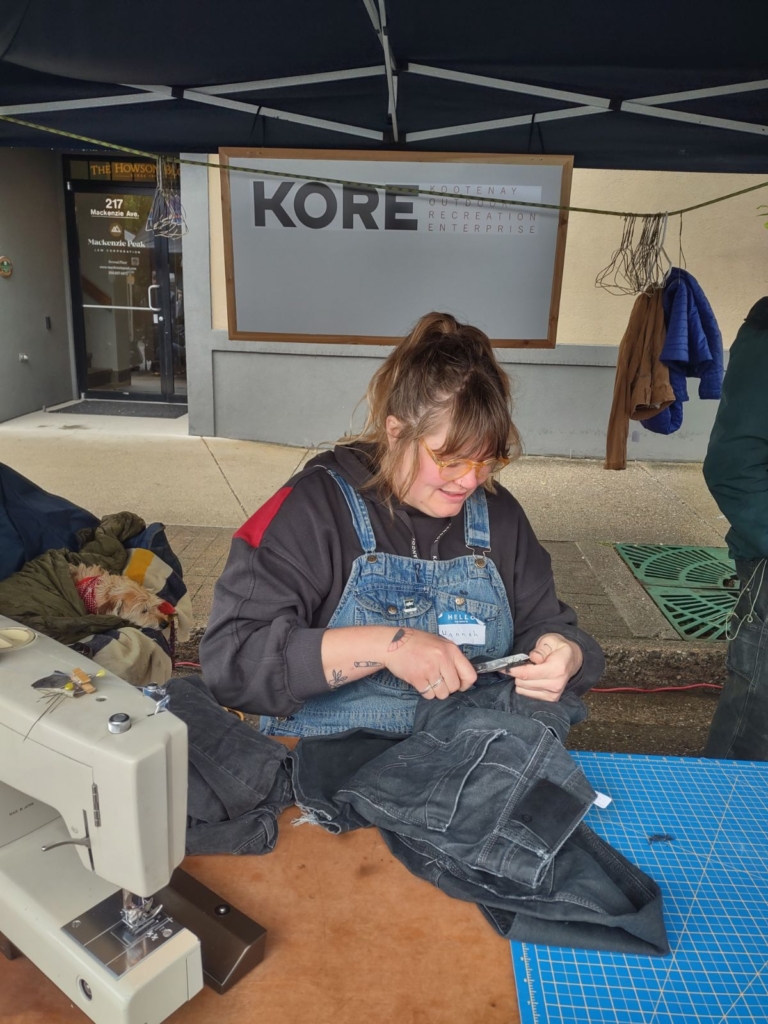The KORE Re-Hub Gear Repair Tour is hitting the road! We’re visiting 12+ locations across the Kootenays from May 25 – September 13 and bringing expert repair technicians and a fully equipped trailer to local community events. Whether it’s a torn jacket or a busted pack, we’ll help you mend your gear so it can stay on the trail and out of the landfill. Plus, don’t miss hands-on opportunities at our DIY station to learn simple repair skills and keep your gear going strong for seasons to come.
2025 Tour Schedule:
May 25: Revelstoke Re-fest
June 7-8: Castlegar Sunfest
June 14: Nelson Farmers Market
June 21: Creston Farmers Market
June 28-29: Kimberley Localpalooza
July 4: Fernie Gravel Grind
July 12: Cranbrook Community Futures
July 13: Kaslo Wild Ultra
July 16: Golden Summer Kicks
July 18: Radium Hot Springs Farmers Market
July 19: Invermere Valley Appreciation Day
September 13: Rossland Arts & Culture Fest
The Hidden Cost of Adventure: Our Gear’s Footprint
The outdoor recreation industry, a $15 billion contributor to British Columbia’s economy, faces a critical sustainability challenge with both soft and hard goods. Less than 1% of materials in outdoor clothing and gear—from jackets and tents to skis and climbing equipment—are recycled, with 85% ending up in landfills, persisting for centuries due to their complex, synthetic compositions.
Mending the Future: ReHub Repair Tour 2025
To promote sustainable and environmentally conscious gear use, KORE is embarking on a repair tour in the summer of 2025. The goal is to make damaged outdoor gear usable again and prevent it from entering landfills, from soft goods like jackets and backpacks, to hard goods such as ski equipment and camp stoves.
The mobile repair and community engagement initiative features a fully equipped repair trailer with industrial sewing equipment and 3D printing supplies. The tour will travel throughout the Kootenay region of British Columbia, offering free repairs on outdoor gear to assess community interest and support for a permanent repair shop. While we aim to complete most repairs on-site, more complex fixes may be arranged through our partners at Selkirk College Repair Lab.
Circular Success Stories: Industry Leaders
Patagonia – What started as a small repair facility in Reno has evolved into a global movement for gear sustainability. Patagonia’s Worn Wear Program revolutionized the concept of used outdoor gear by offering repairs, resale, and their innovative ReCrafted collection. By providing store credit for used gear, they’ve created a circular system that keeps equipment in use longer while building a community of environmentally conscious outdoor enthusiasts.
Arc’teryx – From their Vancouver headquarters, Arc’teryx launched the ReBird Program to extend the life of technical gear through expert assessment, cleaning, and repairs. The program’s innovative approach includes transforming materials from beyond-repair items into new products, demonstrating that even the most technical outdoor gear can have multiple lives while maintaining high performance standards.
NEMO Equipment – NEMO Equipment transformed the traditional warranty model into a sustainability initiative that keeps gear in the field longer. Their Certified Pre-Owned program professionally inspects and repairs used gear before offering it at accessible price points, creating a reliable marketplace for pre-owned outdoor equipment while maintaining NEMO’s commitment to quality.
Diving Deeper: The Complexity of Gear Waste
The outdoor recreation industry, valued at $887 billion globally[1] and contributing $15 billion annually to British Columbia’s economy[2], faces a critical sustainability challenge. While 76% of BC residents engage in outdoor activities[3], the industry’s growth comes at a significant environmental cost.
Less than 1% of materials in outdoor clothing are recycled, with 85% ending up in landfills or incinerators[4]. Modern gear, designed for high performance, often incorporates synthetic materials and toxic “forever chemicals” like PFAS, which can persist in the environment for centuries, releasing harmful microplastics and pollutants[5].
The complex, multi-material construction of items such as ski jackets and skis further hinders recyclability, with each pair of skis generating approximately one ski’s worth of waste and typically lasting only 125 days of use[6], yet their materials persist in landfills for centuries.
However, solutions are emerging: extending a product’s life by just nine months can reduce its environmental impact by 20-30%[7], and initiatives like the Repair Re-Hub are addressing this by focusing on technical repairs, upcycling, and community education.
These efforts, combined with rising consumer demand for sustainable products[8], offer hope for transforming the industry’s approach to gear lifecycle management, turning potential waste into valuable, reusable resources and starting to create circularity in the system by encouraging manufacturers to design for reuse
More To Come
Stay tuned about gear giveaways, surveys, and more coming in the near future as the KORE Re-hub Program gains traction and the 2025 tour is underway.
KORE Outdoors gratefully thanks these funders for their support of our programs and initiatives:






